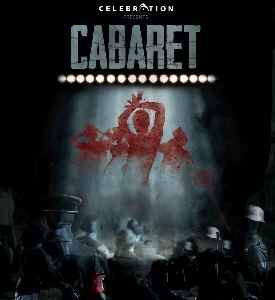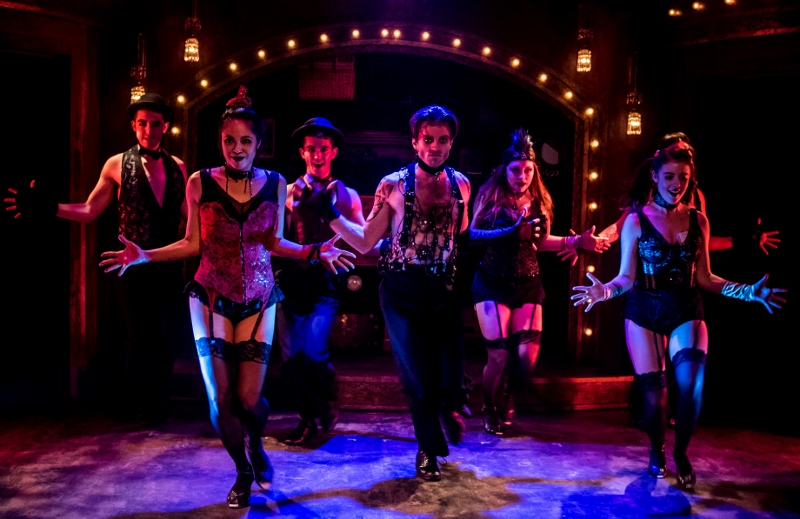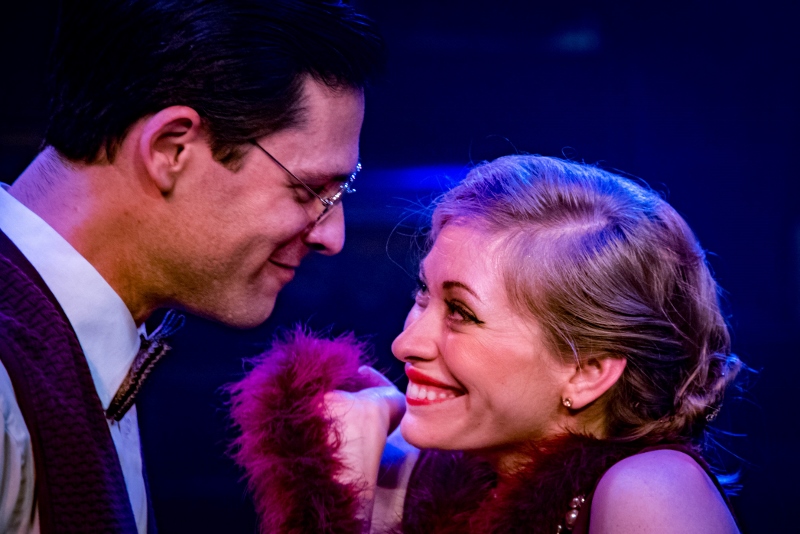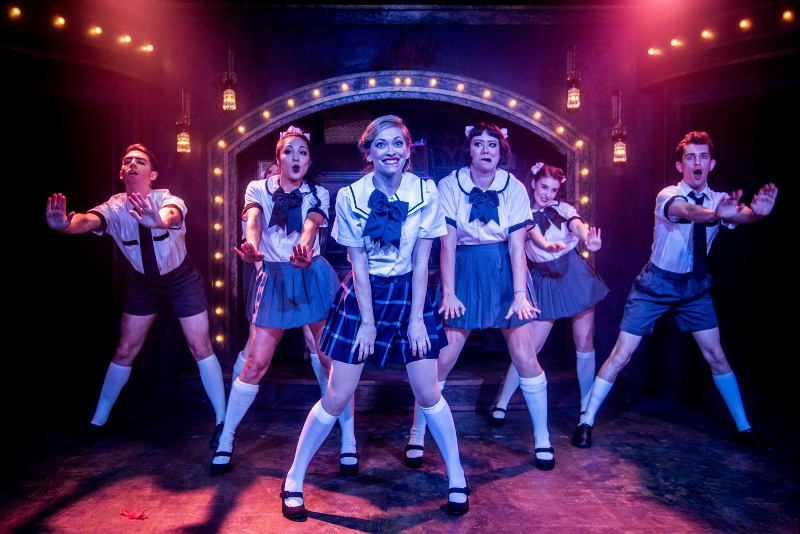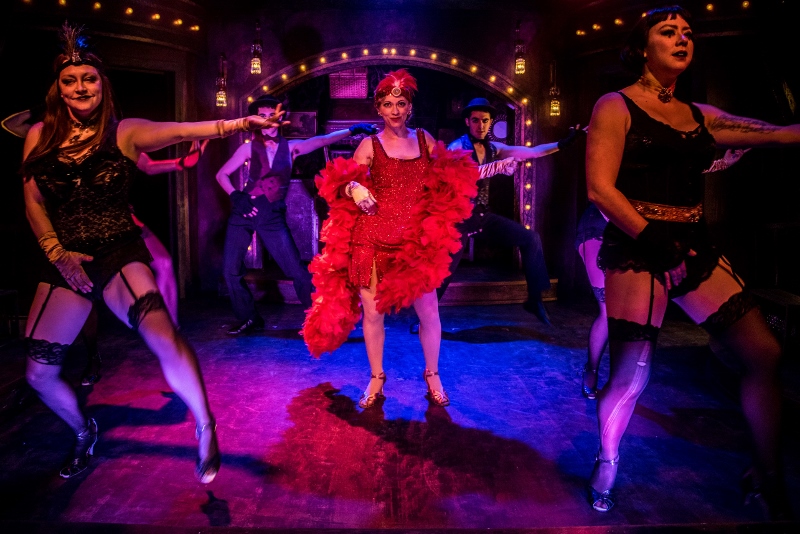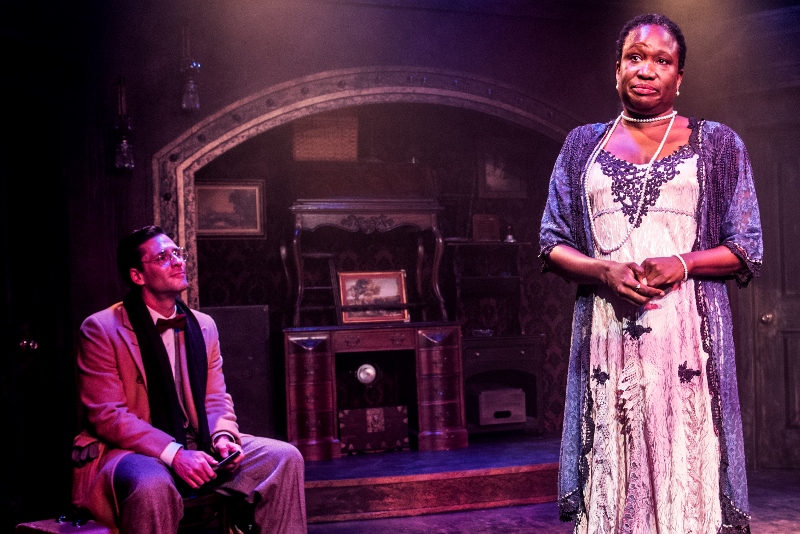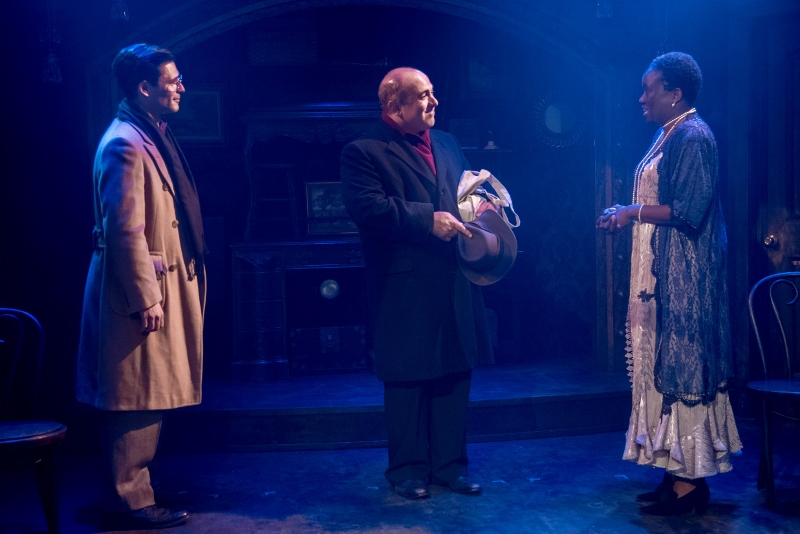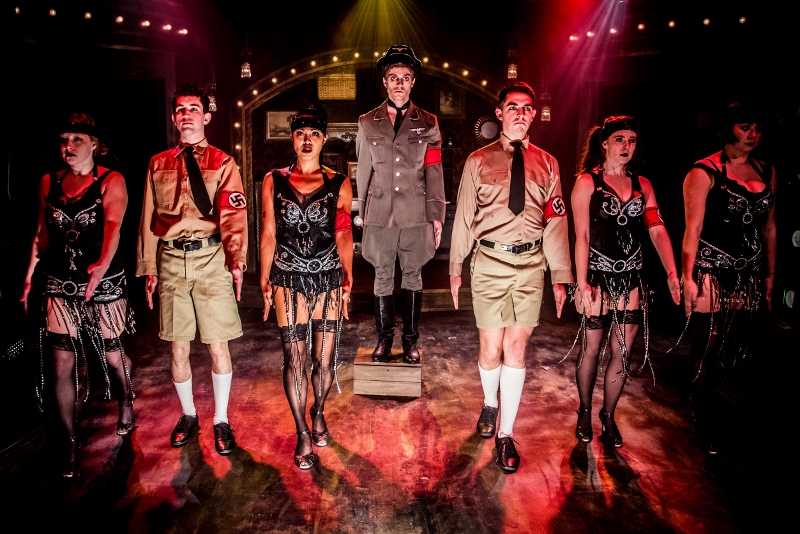COME TO THIS CABARET
Aside from the fact that it will sell out quickly, there are a number of reasons to rush out and get tickets for Celebration Theatre’s revival of Cabaret.
First of all, this is 2018, and a better time to see Cabaret could not be imagined. That may be 1929 Berlin at the dawn of Nazism you are seeing on stage, but it could be right here, right now, as we sit here, not quite complacently, helplessly watching as our country, in the midst of the worst economic inequality in our history, heads towards social disaster. And as much as we’d like to blame one man (the one in the White House) — like we still do with Hitler — the new fascism is our addiction to Corporate America and political correctness. Some of us are paying no attention, some of us are shaking our heads, some of us are wondering where we can go to escape from an unconscionable reality, should escape become necessary. And the entertainment (and that includes news) all around us either lies about the immediate experience or reminds us almost daily, in intentionally absurdist ways, where we are headed.
Second, if you’ve only seen the 1972 film version, brilliant as it is, you owe it to yourself to see it as originally conceived. Or, rather, in this even more risqué rendition of Sam Mendes and Rob Marshall’s 1998 Roundabout revival; this version is closer to the original 1966 outing, but with added songs taken from the movie, and a dose of deviants who embrace a seedy, sordid, sexually liberated Berlin. It could open your eyes. It might even get you to read Christopher Isherwood’s The Berlin Stories (1945) or return to the stunning I Am A Camera (1951), in which playwright John Van Druten recreated for the theater the most powerful and cautionary and bitterly comic ideas of Herr Issyvoo (which was what his German landlady called Isherwood). All of which, I promise you, will make you re-think how closely the Berlin of 1930 resembles the times in which we are living. It’s amazing how one can describe events that actually happened and realize that it could tell us something that would be equally illuminating — in many of the same ways — eighty years later.
But the best reason of all is that Cabaret is being given a smashingly good, brilliantly inventive, gloriously eye-filling, unflaggingly exciting revival. It gives the audience one of those experiences that send a tingle up its spine and reminds it that the play’s the thing wherein to catch the conscience of our times. In short, it’s a hell of a show. It’s a dandy entertainment. And it’s yet another bit of palpable evidence as to why Celebration Theatre, director Michael Matthews, and choreographer Janet Roston are a few of the local treasures of Los Angeles Theater, continually giving us a hint of the amazing theater in Chicago where Mr. Matthews cut his teeth. That they assemble these shows on tight budgets and with limited rehearsal time is always remarkable (Celebration’s Color Purple and Priscilla, Queen of the Desert come to mind). That the creators can come up with something this rich and this bountiful is awesome. You might even say it’s nothing short of a miracle.
Tough muscularity and stringent sardonicism punctuates Matthews’ vision. And as seriously as he takes getting to the heart of this musical, Roston expertly knows how to make the most of the songs and the dances. We are having such a good time that we barely notice the dark side until the laughter curdles inside us and we fully realize that the fun, which is contagious, is at our own expense.
Stephen Gifford’s set has the walls at the 42-seat Lex Theatre covered with textured black wallpaper and antiqued gold frames that would line the hallway of an older boarding house. Differently sized low-lit chandeliers dangle above us while blood-red canopies hang over tables on either side of the stage, with premium onstage seating putting a few lucky patrons right in the Kit Kat Klub, which in this intimate production becomes the dingy, darkened, drug-addled den of iniquity I’ve always imagined it to be. (Music Director Anthony Zediker and his small but mighty band sit above the stage).
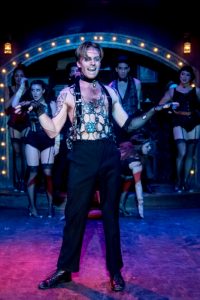 Add to this Michael Mullin’s remarkably apt costumes which give the end of the flapper era a nice little farewell nod while celebrating the club’s sleaziness, and which depict as well the beginning of a new austerity that will eventually be undermined and outshone by those flashy Nazi uniforms. These elements are not mere decoration; they provide historical perspective. But it is Matthew Brian Denman’s lighting that is a technical wonder, utilizing floor and upstage instruments that shine into the audience like the flashlight of a patrolling Nazi.
Add to this Michael Mullin’s remarkably apt costumes which give the end of the flapper era a nice little farewell nod while celebrating the club’s sleaziness, and which depict as well the beginning of a new austerity that will eventually be undermined and outshone by those flashy Nazi uniforms. These elements are not mere decoration; they provide historical perspective. But it is Matthew Brian Denman’s lighting that is a technical wonder, utilizing floor and upstage instruments that shine into the audience like the flashlight of a patrolling Nazi.
Then there is the talented and energetic ensemble that works at a breakneck level to bring the musical numbers to thrilling life. At the center of this marvelous bunch is Alex Nee as the Emcee; this is in no way an imitation of any of the great artists who have made this part so memorable in the past (although there’s a bit of the inflections made famous by Alan Cumming), but a bold new interpretation. His playful dominance and sexy piercing glances, coupled with smiling eyes that mask his true intentions, make him, often at one and the same time, both loathsome and wickedly charming. And, despite the comic acuity with which he delivers the Emcee’s most familiar songs — “Willkommen,” “Two Ladies,” “The Money Song,” “If You Could See Her” — he is absolutely chilling in his version of “I Don’t Care Much,” a song cut from the original version and thoughtfully re-inserted this time around and which adds a dimension to the Emcee’s character it never had before.
It may come as a surprise to anyone who saw Liza Minnelli barrel her way through the part in the picture, that Sally Bowles, as great a character as she is, was always a weak link in this musical version, and so Talisa Friedman is a revelation in the role. From her rubber-legged Charleston in “Don’t Tell Mama” to her, at first, purposefully tenuous and, at last, sarcastically triumphant, coked-up, crackly voiced “Cabaret,” she creates an extraordinary portrait of a woman who pushes her fears away by being wackily outrageous and determinedly blind to her surroundings, let alone to her own limitations as a performer. It is no easy task to play someone with little talent and still carry off one of the great songs in the history of musical theater.
Then there is the role of Fräulein Schneider, the warm but crafty landlady of the boarding house where the central characters live when they are not drowning their sorrows at the Kit Kat. You will notice first that the actress June Carryl is black. In Mein Kampf, Hitler described children resulting from marriages to African occupation soldiers as a contamination of the white race “by Negro blood on the Rhine in the heart of Europe.” So it seems strange — knowing this burgeoning party believed in eugenics — that Nazis would allow a black woman to couple with a white man. But that is soon forgotten as the penetratingly persuasive Ms. Carryl reminds us that the part, originally written for the great Lotte Lenya, has some of the best songs that John Kander and Fred Ebb wrote for the show, most of which were jettisoned (as was the character, for the most part) for the film version. “So What?” and “It Couldn’t Please Me More” and “Married” and especially the hard-edged “What Would You Do?” epitomize the arc of Cabaret as much as the Emcee’s songs do. And Ms. Carryl finds the essence in each one and every time stops the show dead in its tracks, locating, as she does, the coldness lurking beneath her naturally warm heart. She gets superb help, in two of the songs, from Matthew Henerson as Herr Schultz, the Jewish fruit vendor she plans to marry before the Nazis give her warning that she might be making a serious mistake (in fact, one can’t help but wonder why his “Meeskite” always gets cut, especially when they have as good a Schultz as Henerson is).
The remarkable cast includes Christopher Maikish as the American writer, Cliff, who is a stand-in for Isherwood; Katherine Tokarz as Fräulein Kost, a whore with a penchant for young sailors; and John Colella as Ernst, a Nazi smuggler. The hard-working chorus are Tanner Rampton and Tristan McIntyre — as a couple of voraciously hormonal homosexuals — and Jasmine Ejan, Sarah Mullis, Nicole Stouffer, and Mary Ann Welshans as the Kit Kat girls.
Finally, if you miss this Cabaret, well — what can I say? — you’re missing one of those occasions when good old show-biz transforms itself, for a few glittering hours, into something approximating high art.
photos by Matthew Brian Denman
Cabaret
Celebration Theatre
Lex Theatre, 6760 Lexington Ave. in Hollywood
Thurs-Sat at 8; Sun at 2; Wed at 8 (understudy performances)
ends on July 15, 2018 EXTENDED to September 16, 2018
for tickets, call 323.957.1884 or visit Celebration
